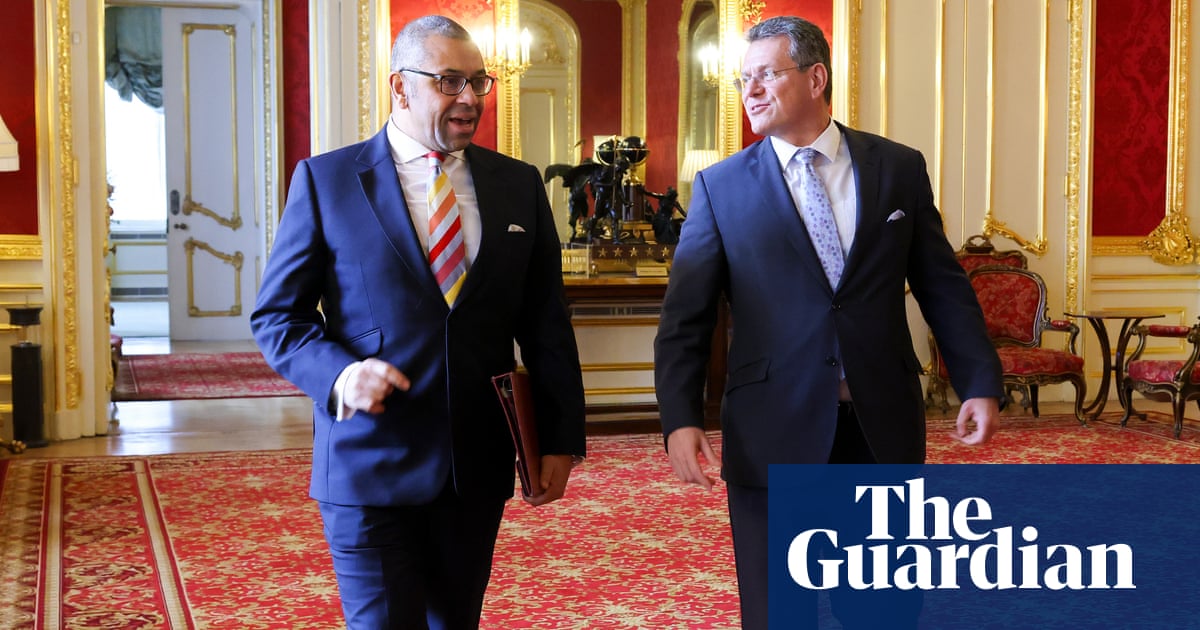
A glimmer of hope of a solution to the dispute over the Northern Ireland Brexit arrangements has emerged after a fourth week of talks ended on Friday.
After a week of recriminations and the threat of a trade war, the European Commission vice-president Maroš Šefčovič said there had been a change in tone from the UK’s Brexit minister, David Frost, confirming the UK had stepped back from the brink of triggering article 16 of the Northern Ireland protocol.
He confirmed talks would continue for a fifth week but said serious headway was still needed with the UK’s red line over the European court of justice was still an obstacle.
“I acknowledge and welcome the change in tone of discussion with David Frost today, and I hope this will lead to tangible results for the people in Northern Ireland,” he told reporters at news conference in London after the talks.
In a statement, Lord Frost’s office said “significant gaps remain to be bridged” and that the threat of article 16 remained on the table. But it noted that Frost’s preference was “to find a consensual way forward”.
Šefčovič told reporters at a news conference that the people of Northern Ireland deserved a solution from politicians. “That is why I raised forcefully that we need to make serious headway in the course of next week,” he said.
“This is particularly important as regards the issue of medicines. An uninterrupted long-term supply of medicines from Great Britain to Northern Ireland is the protocol-related issue on everyone’s mind in Northern Ireland.”
However, he added: “On the European court, on our side definitely nothing has changed.”
A UK government spokesperson said the “talks had so far been conducted in a constructive spirit” and that it had been “underlined that in order to make progress, it was important to bring new energy and impetus to discussions”.
“Accordingly, intensified talks will take place between teams in Brussels next week on all issues, giving particular attention to medicines and customs issues,” said the spokesperson.
After a week of brinkmanship involving threats to trigger article 16 and a retaliatory trade war, Šefčovič appeared more upbeat about the chance of a rapprochement. He also revealed he had a mandate from member states to “look for solutions”.
He said the chance of a deal on clearing barriers for medicine supplies was “quite low-hanging fruit” and could “create momentum in talks”.
Earlier on Friday, Boris Johnson’s former special adviser Dominic Cummings suggested that the prime minister had a poor grasp of the meaning of the Brexit withdrawal agreement he had signed in January 2020, questioning what the departure from the EU’s customs union meant at a meeting 10 months later with Frost.
“It wasn’t until October 2020 that [Boris Johnson] even vaguely realised what the customs union is,” Cummings tweeted, a reference to a key part of the withdrawal agreement through which the UK would get a clean break from the EU outside the single market and its special customs club.
He wrote that the PM’s “face was priceless” when Frost explained.
“I will never forget the look on his face when, after listening to Frost in a meeting on the final stage of the [trade deal] negotiation, he said, ‘No no no Frosty, fuck this, what happens with a deal?’ and Frost looked from his paper and said, PM this is what happens with a deal, that’s what leaving the customs union means.”
As the EU and the UK appeared to step back from the brink of a trade war, Šefčovič said he and Frost agreed that “we should focus like a laser beam” next week on the issues relating to medicines and customs.
“I’ve done a lot of this type of negotiations and my experience tells me that if you want to have success at the end of the negotiations, we need a stocktaking of what the problems are, we should try to solve them one by one,” he said. “We should take away problems from the table and not bring new ones to an already very complicated stack of issues.”












